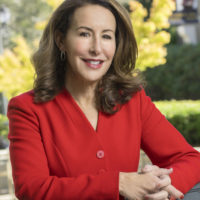We are pleased to support the research of UC Berkeley faculty and PhD students who are examining topics related to diversity, equity, and inclusion. Contact Zena Barakat for more information.
Faculty Grantees

Jennifer Chatman
Who Gets to Set Norms? Viewing Outliers Through Race and Gender Lenses
Past work demonstrates that individuals overweight the behavior of outliers when making judgments about the prescriptive and descriptive norms of a group. In the current research, we draw upon an intergroup perspective to examine how social identity processes influence the perception of outliers. Specifically, we explore whether the gender and/or race of an outlier affects how influential outlying behavior has over the perceived descriptive and prescriptive norms of a group. Preliminary evidence reveals that individuals’ perceptions of prescriptive and descriptive norms shifted towards the outlier, but only when the outlier was a man. In the current work, we will examine whether our effect persists when manipulating the race of the outlier and investigate whether status attributions explain this effect. Ultimately, we hope that this work will highlight the subtle mechanisms of norm perception and identify who is licensed to define and modify a group’s norms.

Douglas Guilbeault
Identifying Stereotypes in Online Images and Their Implications for Algorithmic Bias
Millions of people everyday rely on search engines and recommendation algorithms to access information, raising concerns about how social biases can rise and spread through search results. Recent methods have identified stereotypes in the online texts retrieved by search engines, such as news articles and advertisements. Yet, concerningly, psychological research suggests that stereotypes may be even more influential in online images. However, image-based stereotypes have been notoriously difficult to quantify and have received far less attention in large-scale audits of online stereotypes. In this project, I develop a novel method for measuring stereotypes in publicly searchable image datasets – including Google and Wikipedia – and for comparing these stereotypes with those that arise in online texts from the same sources. This project will enrich efforts to identify and mitigate social biases in machine learning applications trained on public images – social biases that are strikingly costly for companies and society at large.

David Holtz
Race and gender disparities in STEM
Previous research has documented race and gender disparities in who enters STEM professions, including the presence of bias in hiring processes. In this project, we aim to identify the micro-interactional behavioral routines that are associated with higher evaluations for technical job interviews. Doing so will deepen our understanding of the interactional dynamics in technical interviews that lead white male job seekers to gain disproportionate representation in STEM professions.

David Levine
Integrating DEI into core macroeconomics
Macroeconomics studies the economy as a whole. I will be examining how gender, race, caste, and other forms of diversity affect what we measure, how economies grow, who is unemployed, etc. Examples include how GDP measurement ignores traditional (mostly female work at home), how investment in human capital varies by sex and race or caste in many societies, how slavery and colonialism affected institutional development, etc.

Abhishek Nagaraj
What Drives Gender Inequality in Cultural Consumption?
The proportion of female artists in popular music is estimated to be between 20 to 25% today. Our research hopes to shed light on the causes of this gap and propose some solutions using descriptive, quasi- and field experimental evidence from Pandora, a popular music streaming platform.

Olivia Natan
Social Movements & Consumption Patterns
This project investigates the short-term and long-term effects of social movements on consumption patterns and entrepreneurial outcomes. We specifically focus on measuring the extent to which the increase in awareness of racial bias and the increase in social justice protests following the murder of George Floyd translated into material gains for Black entrepreneurs. Secondarily, we study to what extent these gains were sustained vs. short-lived, from what demographic groups and consumer types did Black businesses see increased support, whether there is evidence of a racial backlash effect, and whether specific actions taken by online platforms to highlight Black-owned businesses contributed to any of these outcomes.

Ricardo Perez-Truglia
Gender Pay Gap
Why do firms pay less to some minority groups, such as women? We propose a novel hypothesis: perhaps the pay gap exists, in part, because employers are unaware of them. Firms do own sufficient data (their HR records) to measure the gender pay gap. However, the data may not be easy to access to the decision makers, or firms may not have the statistics and economics expertise to analyze the data properly. Our hypothesis is motivated by the growing number of firms using pay-equity tools to analyze pay inequities by gender and ethnicity in their own organizations. Despite their growth, these tools rarely make their way into public view, and have not been studied by economists. We are collaborating with one of the firms that provides a pay equity tool to employers. We want to measure the effects of this tool on the gender pay gap.
PhD Grantees

Sandy Campbell
Gender Differences in Award Choice
Awards are ubiquitous in organizations, and are only increasing in use over time. Extant literature on gender and awards finds that women who win awards get less money and prestige, but fails to pin down the mechanisms through which this effect occurs. In our project, we plan to manipulate the salience of gender identities, and examine how that affects what types of awards women are granted. We additionally plan to look at what effect receiving service awards has on subsequent performance. Specifically, we predict a Matthew effect: when women are given service awards, they will double down on service, which further hurts their performance through decreasing the amount of time they dedicate to performance tasks.

Sahiba Chopra
The Impact of Prior Startup Experience on Inequality in Entrepreneurship
Our study focuses on startup firms in the US. The goal of this study is to shed light on the gender gap in startup growth. Why do female-founded tech startups grow less than male-founded tech startups? Most research on diversity gaps among entrepreneurs has focused on the difference in venture capital funding, social ties, and personality traits. We look at another possible explanation: the gap in opportunities to gain entrepreneurial skills. Specifically, working for a startup exposes employees to the skills and opportunities that contribute to a startup’s success. However, opportunities are not equally distributed in tech startups in the US – less than one-third of the people employed at tech startups in the US are women. We want to understand the extent to which prior career trajectories can help explain gender inequality in startup growth.

Caleb Dawson
Antiblackness and Pro-Black Social Action at UC Berkeley
Across the United States, organizations have been compelled by internal and external pressure to reckon with antiblackness. Such reckoning has often been led by Black leaders. Based on observations and interviews with various constituencies, internal documents, and media, I analyze how Black campus leaders of various statuses – undergraduate, graduate students, staff, faculty, administrators – have been contesting antiblackness at the University of California, Berkeley, from 2014 to 2022. In doing so, I investigate the challenges and supports they experience from the Black campus community and university administration as well as how gender and organizational status shape their experiences of antiblackness, their efforts to contest it, and the university’s response to their pro-Black social action. This political ethnography presents the gendered and classed facets of antiblackness at a famously progressive and elite public university as well as what it takes for Black people to lead efforts within an antiblack organization to defend and cultivate Black life.

Lukas Leucht
Entrepreneurship and Personality Traits
In this project, we aim to investigate the role that character dispositions play in determining who becomes an entrepreneur, looking at their consequences for women’s career attainments and success on the workplace. Our objective is exploring what we believe is a fundamental – albeit short-changed by the academic literature – determinant of entrepreneurial success: personality traits. This variable is usually neglected from empirical analyses due to lack of large-scale measurement. Exploiting a novel measurement approach coupled with unique Finnish administrative data, we will be able for the first time to shed light on this topic on the near-universe of the Finnish workforce using individual data spanning almost forty years. Thanks to these comprehensive data, we can first shed light on how differences in personality impact women’s careers, decisions to become entrepreneurs, and their success on the workplace.

Sonya Mishra
Lack of Awareness or Willful Ignorance: Occupying higher hierarchical rank leads men, but not women, to perceive less inequality
New evidence suggests that occupying higher organizational rank may reduce men’s perceptions of inequality. In two pilot studies and an archival study from a sample of 4,814 U.S. employees, I find evidence suggesting that men, to a greater extent than women, perceive less inequality in their organization as a function of their higher organizational rank. In the proposed research, I seek to demonstrate the generalizability of this effect and investigate whether the effect emerges due to motivational factors (e.g., high-ranking men’s greater system justification) or situational factors (e.g., reduced personal exposure to inequality). Additionally, given research has linked weak perceptions of inequality with less effort to alleviate inequality, I test whether hierarchical rank negatively influences men’s allocation of resources to alleviate inequality. Given corporate leadership tends to be male-dominated, the consequences of hierarchical rank reducing ¬¬men’s perceptions of inequality may create a cycle in which gender inequality perpetuates.

Miguel Ortiz
Moral Structures and Inter-group Conflict: Evidence from Ethiopia’s Ethnic Conflict
Conflict among social groups, like ethnicities and religions, affects the economic development of many low-income countries. Still, we know very little about what, at the individual level, allows people to support or participate in violence against another social group. If there is a moral cost of participating in violence, how is it determined and how does it vary across individuals? I posit that people can be classified by the way their sense of morality changes depending on the group membership of the other person, and that this classification explains who is more likely to overcome the moral cost of violence and hostility in it.

Charlotte (Charlie) Townsend
Gender differences in power and status perceptions of the powerful
Do people associate men with power and women with status due to gender stereotypes? Does this association lead to greater recognition for men with power and women with status? This research will explore how implicit associations shape our perceptions of jobs and gendered expectations of who should fill those roles. In a previous experiment, we tested how individuals on the Powerful People and Powerful Women lists are influential. We found that the men were significantly more likely to be recognized and were rated significantly higher in power than the women, but women were rated significantly higher in status than the men. We also found that men who were rated higher in power were more likely to be recognized by participants, whereas for women, higher status was correlated with recognition. In this research we plan to disentangle whether the two lists highlight societal preferences or gender differences in preferences.
